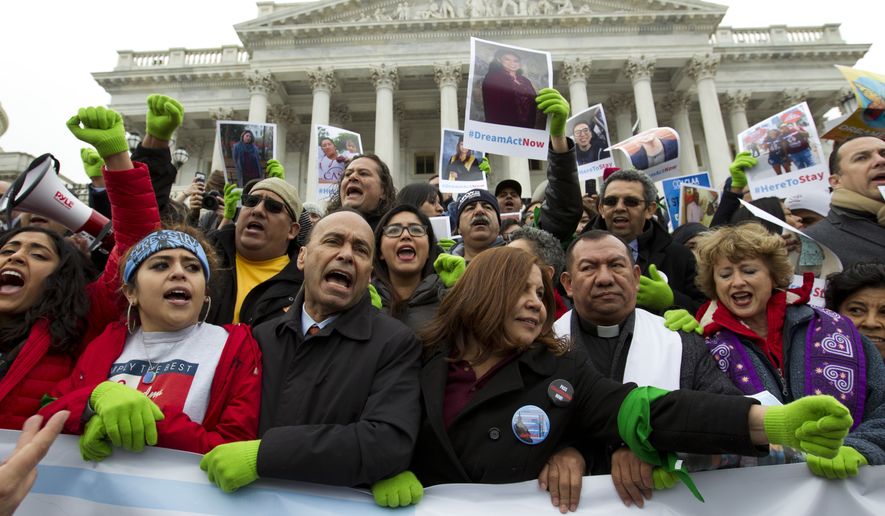Immigration to the U.S. hit a low after the Great Recession but came roaring back in the later years of the Obama administration, with 1.8 million migrants arriving in 2016 alone, according to an analysis being released Thursday.
The 1.8 million would match the U.S. record set in 1999, according to the Center for Immigration Studies, which extrapolated the 2016 numbers based on the first six months of that year.
The migrants included new green card holders, signifying permanent legal residence, as well as illegal immigrants, asylum seekers and long-term “visitors,” such as guest workers and students, many of whom eventually became permanent residents.
The numbers are 53 percent higher than in 2011, when the recession tamped down migration patterns, with just 1.1 million entering. The number grew to 1.5 million by 2014, topped 1.6 million in 2015 and is now projected to be about 1,796,000, the center said.
“These dramatic increases are truly extraordinary,” said Steven A. Camarota, research director at the center and one of the report’s authors.
He said it raises important questions about chain migration, which is the method of current immigrants sponsoring their families, creating a self-perpetuating cycle of growing immigration.
President Trump has called for major changes to U.S. policy to reduce chain migration and has asked that those changes be part of any deal on legalizing illegal immigrant Dreamers — a debate expected to take place early next year.
Chain migration has become even more controversial amid a growing number of immigrants who entered the U.S. as part of a family and who are now being implicated in terrorist attacks against the U.S.
The suspect in the botched New York City subway attack from earlier in December entered the U.S. through the most distant family chain migration possible.
The administration over the weekend said a man who opened fire on police in Pennsylvania last week came to the U.S. from Egypt on a family-based visa, and another person charged with laundering bitcoins to support the Islamic State came to the U.S. from Pakistan on a family visa.
“These incidents highlight the Trump administration’s concerns with extended family chain migration,” said Homeland Security Department spokesman Tyler Q. Houlton.
Some immigrant rights advocates and liberal pressure groups object to the term “chain migration,” arguing that it’s insulting to immigrants.
Democrats have resisted calls for limits to chain migration, saying it would betray the country’s history as a nation of immigrants. They have said the debate over the fate of Dreamers shouldn’t be tied to any major decisions about reforming the immigration system because Dreamers fall into a specific and deserving category of illegal migrants.
The Migration Policy Institute, another immigration think tank, has calculated that Dreamers would bring in an average of one additional person in chain migration over their lifetimes — far less than the average new legal immigrant.
All told, Mr. Camarota said, the U.S. had some 43.7 million foreign-born people in 2016, up from 40 million in 2010.
The composition of the new arrivals has changed over the past decade, with illegal immigrants accounting for a smaller number.
That means the new migrants as a whole are less Hispanic and more educated — though Mr. Camarota still projects about 190,000 of the 1.8 million migrants in 2016 will be Hispanic and have no more than a high school education.
He based his calculations on Census Bureau numbers up through the first six months of 2016, when 1,031,000 people arrived as immigrants or long-term visa holders. He then extrapolated that to a full year’s numbers, based on historical trends.
Mexico remains the largest single source of foreign-born, at 11.6 million — though that was down 1 percent from 2010, he calculated.
By contrast, immigrants from China are up 25 percent, from India up 37 percent, and from Nepal 86 percent.
The number of migrants from predominantly Muslim counties stands at 2.8 million, up 29 percent since 2010.
• Stephen Dinan can be reached at sdinan@washingtontimes.com.




Please read our comment policy before commenting.